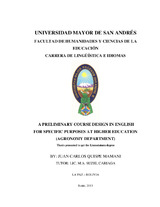Mostrar el registro sencillo del ítem
A preliminary course design in english for specific purposes at higher education : Agronomy Departament
| dc.contributor.author | Quispe Mamani, Juan Carlos | |
| dc.contributor.author | Cariaga de Álvarez, Suzel (Tutor) | |
| dc.date.accessioned | 2018-07-12T02:49:52Z | |
| dc.date.available | 2018-07-12T02:49:52Z | |
| dc.date.issued | 2013 | |
| dc.identifier.citation | Lenguas Extranjeras | es_ES |
| dc.identifier.uri | http://repositorio.umsa.bo/xmlui/handle/123456789/16918 | |
| dc.description.abstract | In Bolivia, at the university level, English is taught for Specific Purposes (ESP) and for General Purposes (EGP) as well, and in the primary and especially secondary level, English is taught for General Purposes, but generally students finish schools with a low level of English language. This has to change with the new educational law. Hence in higher education we have to concentrate on English for Specific Purposes (ESP) which is known as Technical English. To do this, it is necessary to design ESP courses for all departments of both private and public universities. For this reason, the objective of the research is to find out the attitudes, needs and objectives on students and professors in the Department of Agronomy ‘UMSA’ (Universidad Mayor de San Andrés) in order to make a preliminary Course Design on English for Specific Purposes (ESP) for the Department of Agronomy. To achieve the general and specific objectives I divided the research in six chapters. The research approach I used was mixed, since I used the combination of quantitative and qualitative approach, but the design I applied was the design with dominant approach; where the quantitative approach was the most dominant and some of the elements of qualitative approach were used such as the open interviews. The type of research was Descriptive with a non experimental design. Students and professors of Agronomy Department were the population, they were addressed by applying questionnaires and open interviews to a sample of students and professors. The results demonstrated that students and professors of the Agronomy Department had a positive attitude towards the English language and they had needs and objectives in terms of English for Specific Purposes The specific objectives of the research were accomplished. The case study done in the Agronomy Department established the following elements in the preliminary course design: Common and dynamic axes, the Goals, the objectives, the syllabus which is divided into the Foundation course and English for Specific Purposes, the eclectic Methodology applied in the course, Materials and finally the Evaluation of the ESP course. To finish this chapter a review of theoretical and practical aspects of ESP course design around the world was done. So ESP has to be established not only in the Department of Agronomy but in all tertiary education in Bolivia because students, professors and professionals nowadays have needs and objectives in terms of English for Specific Purposes. And with these results I can say that students in the Agronomy Department are motivated to learn English because of a positive attitude towards the language of science, technology and communication with the world. For these reasons, it is essential to work on English for Specific Purposes for all departments, for all regions of Bolivia in public and private universities in order to increase the quality of our Bolivian professionals. Key words: ESP, higher education, course design, Agronomy, students, professors, attitude, needs, syllabus | es_ES |
| dc.language.iso | en | es_ES |
| dc.publisher | Universidad Mayor de San Andrés. Facultad de Humanidades y Ciencias de la Educación. Carrera de Lingüística e Idiomas. | es_ES |
| dc.subject | INGLES - ENSEÑANZA | es_ES |
| dc.title | A preliminary course design in english for specific purposes at higher education : Agronomy Departament | es_ES |
| dc.type | Thesis | es_ES |

